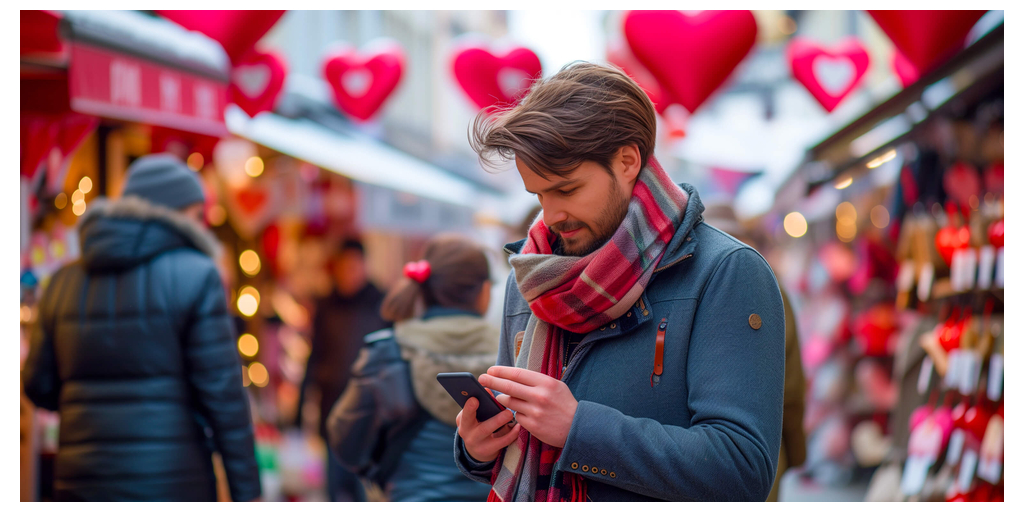
While many Americans tell pollsters they are not loving the potential impact of AI on society, with 75% saying they are concerned about misinformation from artificial intelligence, they are certainly loving the tools it provides to express their love on Valentine’s Day.
A new survey from McAfee Research has found that nearly half (45%) of all men will use AI to write love messages this Valentine’s Day, up from 30% last year. The survey also found that more Americans (39%) are looking to use AI to write Valentine’s Day messages than last year (26%).
Overall the survey found a growing prominence of AI tools in the love lives of Americans, both for good and ill. The survey found that the increased use of AI has produced greater concern for telling real from fake online, with 58% of Americans encountering fake profiles online. About 30% of men and 27% of women said they are using AI to enhance their online dating profile, pics, and messages online. In addition nearly one third of Americans (31%) say they communicated with a love interest who turned out to be a scammer
McAfee’s second annual “Modern Love” study surveyed 7,000 people in seven countries worldwide and discovered that nearly one in four (23%) Americans are using AI tools to help create photos or other content when dating online.
This contrasts sharply with people’s feelings about receiving AI-generated content: Nearly two-thirds (64%) expressed distrust towards potential love interests who used AI-generated imagery and chat bots on their profiles. Further, the prevalence of romance scams emerged with one-third (31%) of Americans saying their conversations with a potential love interest online turned out to be with a scammer.
Despite mixed feelings and experiences, the effectiveness of AI is undeniable: 69% of people reported receiving more interest and better responses using AI-generated content than when they drafted or used their own original content. Additionally, 39% of Americans are planning to or considering using artificial intelligence to write a Valentine’s Card or other messages to a love interest. This sentiment opposes their feelings about being romanced via code: 57% of people said they would be hurt or offended if they found out AI wrote their Valentine's message.
“The possibilities of AI are endless, and unfortunately, so are the perils. For people who are shy about starting conversations, short on time to craft the perfect message, or whose photos could be brightened, AI offers tools to help enjoy all the fun and excitement that comes with online dating,” said Steve Grobman, McAfee’s Chief Technology Officer.
"Unfortunately, we know cybercriminals also use AI to scale malicious activity. With love-seekers spending more time online leading up to Valentine's Day, scammers are using AI to pose as love interests to steal money or personal information,” he continued. “We encourage people to balance romantic hope with healthy skepticism, to pause before sharing sensitive information online, and to ensure they use the right tools to protect their privacy, identity, and personal information."
Other highlights of the survey include:
- Online dating remains pervasive, with 58% of Americans using, or having used, dating websites, apps, or social media to find love. However, the rise of powerful, easy-to-use AI tools complicates the online dating landscape. By leveraging these tools, romance scammers can craft convincing messages and realistic profile images to trick people looking for love online. Nearly half (46%) of Americans said they are unsure or don’t believe they could identify AI-generated love messages.
- Those looking for love are often more vulnerable to scams, and cybercriminals use that vulnerability to their advantage by engaging in long and sophisticated attempts to steal from victims. 57% of Americans said they were asked to transfer money soon after meeting a love interest and 30% of these people were asked to send more than $1,000.
- These findings underscore the escalating threat of romance scams in the digital dating world and the need for increased online dating security awareness and protection.
- 1 in 10 (11%) of respondents reported having a love interest ask for passwords.
- 20% were asked to share their birth date.
- 23% were asked to share an intimate photo or video.
- 10% were asked to share a social security number or something similar.
- McAfee Labs is reporting that increased Valentine-related malware campaigns (25% surge), malicious URLs (300% increase), and a variety of romance-themed spam and email scams (a staggering 400% increase), with the majority focused on Valentine’s shopping and gifts.
- The use of AI-generated images for fake profiles and photos appears to be growing: 58% of people said they’d come across fake profiles or photos that look AI-generated in the past year, on dating websites, apps, or on social media. Specifically:
- 46% of people saw fake profiles or photos on social media platforms.
- 20% of people saw fake profiles or photos on mainstream dating platforms.
- 14% saw fake photos or profiles on chat forums or communities.
- 12% saw fake photos or profiles on specialized dating platforms.
- 11% saw fake profiles or photos on professional networking platforms.
- In a dating pool filled with an increasing number of scams and AI content, online daters are doing their dating diligence: 38% said they used reverse image search on profile pictures of people they’ve met on social media or dating sites; 59% of respondents said they often use social media to dig into the background of their potential partners; of those who have done so, 35% said it made their opinion about them more positive, and 23% said it made their opinion about them more negative; 13% said doing so made them realize they were being scammed, and 7% said they realized their potential partner had scammed others before; 11% said social media sleuthing made them realize their love interest was in a relationship with someone else.





